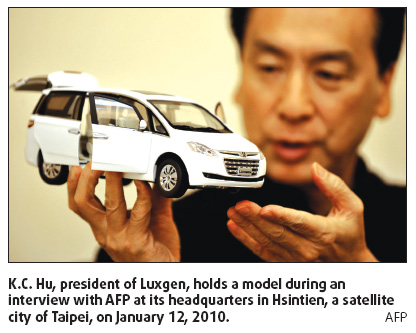Carmaker touts new mainland-targeted luxury sedans
Updated: 2010-02-04 07:34
(HK Edition)
|
|||||||||

TAIPEI: Luxury sedans would seem a risky bet in a time of global economic strife, but Taiwan's Yulon Motor believes it has found the right formula: Its car is cheap and it is destined for the mainland market.
Yulon's Luxgen model boasts global positioning, night vision and blind-spot cameras. With the car priced at NT$800,000 ($25,000), the company hopes it will appeal to tech-savvy but only moderately wealthy mainland consumers.
"Many of the functions will be found only on luxury sedans worth up to five times as much," K.C. Hu, president of Yulon Group subsidiary Luxgen Motor Co, told AFP in an interview.
Yulon put the finishing touches to the Luxgen - coined from the words "luxury" and "genius" - last year, when the car market worldwide was deep in the doldrums.
"Looking back, we'll find that we couldn't have picked a better time than last year to recruit the talent and buy the equipment we need," said Hu, adding, "If we had postponed the launch of the brand, it would have cost a whole lot more money."
Yulon was founded in 1953 as Taiwan's government pursued ambitions to create a homegrown auto industry. That goal was scaled down over the decades and now Yulon is best known for producing Nissan cars in Taiwan, on licence.
The Luxgen project, started more than four years ago, has cost Yulon about NT$15 billion, but it says the gamble is already paying off.
The first Luxgen - a 2.2-liter minivan for family use - was unveiled in Taiwan in September and since then Yulon has received orders from more than 3,000 local motorists.
In a market where monthly sales of people-carriers are a meager 300 units, the response has been encouraging.
Buyers say they like its high-tech system, developed jointly with Taipei-based HTC Corp, one of the island's leading smartphone suppliers.
But Taiwan, with its population of 23 million, offers limited opportunities, which is why Luxgen is looking to the billion-plus mainland market.
Cross-Straits trade has rocketed since Taiwan relaxed a decades-old ban on civilian contacts with the mainland in 1987.
And with sales topping 13 million units last year, the mainland has replaced the United States as the world's biggest auto market.
"It's unlikely the Luxgen would turn a profit if its sales were confined to Taiwan," said Kevin Tsui, an analyst with SinoPac Securities, who added, "The local market is too small to support the development of a local brand."
The Luxgen series for the mainland market may be produced at a plant in the eastern mainland province of Zhejiang, a joint venture with Dongfeng Automobile Co that is awaiting the green light from Beijing.
"The odds of success are 50 percent," Tsui said. "However, if it (Yulon) did not do it this way, it would have no chance of surviving in today's extremely competitive market."
Yulon has already invested in a joint venture with a mainland automaker and Daimler to make Mercedes vans in the southeastern province of Fujian.
This marks Yulon's most ambitious foray since 1986, when it launched another model based on its own technology, a series of cars called "Feiling".
But the Feiling project failed because it could not match the cutting-edge auto technology of the day.
"Yulon learnt a lot from the painful lesson. The success of Luxgen, at least initially, was built on that experience," said Toreo Lin, editor-in-chief of Taipei-based Auto Graphic magazine.
China Daily/AFP
(HK Edition 02/04/2010 page2)